
Through a survey on social media, CURE® collected responses on what terms people prefer when describing their cancer experiences. Some people who have experienced cancer explain why they have embraced the terms "thriver" and "warrior."

Through a survey on social media, CURE® collected responses on what terms people prefer when describing their cancer experiences. Some people who have experienced cancer explain why they have embraced the terms "thriver" and "warrior."

CURE® surveyed its audience to see which terms they prefer to use when describing their cancer experiences. Some people who have experienced cancer explain their mixed feelings with the commonly used terms “patient” and “survivor.”

I recently came across a Twitter thread where people were shaming a cancer survivor’s decisions, forcing me to step back before reacting.

CURE® surveyed its audience to see which terms they prefer using when describing their cancer experiences. Some people who have experienced cancer explained why they dislike certain labels.
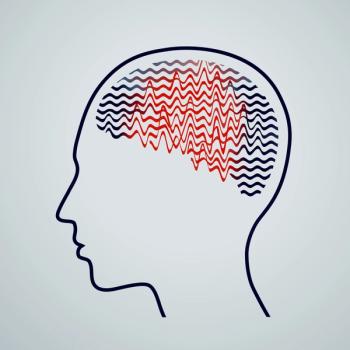
Study findings showed that anxiety and depression may not decrease over time in patients with testicular cancer, emphasizing the importance of discussing symptoms with cancer teams.

A kidney cancer diagnosis may negatively affect a patient’s mental health; however, exercise may help put them at ease.

Going through chemotherapy treatment was extremely difficult, and eventually I learned that sometimes, it’s OK to not be OK.

CURE® surveyed its audience to see how they cope with “scanxiety,” the anxiety surrounding cancer scans. Here’s what they had to say.

An expert recommends that cancer survivors and patients take several actionable steps to improve their quality of sleep.

When I found myself struggling with anxiety and depression after cancer and COVID-19, I decided a therapy dog might be a good idea, so I adopted one.

A patient with prostate cancer under active surveillance may encounter the fear that their cancer might progress, causing stress and anxiety. However, HIIT workouts may help put them at ease.

There are ways to manage the fear of cancer recurrence, so it doesn’t become overwhelming or debilitating. Physicians like me and a network of resources are here to help.
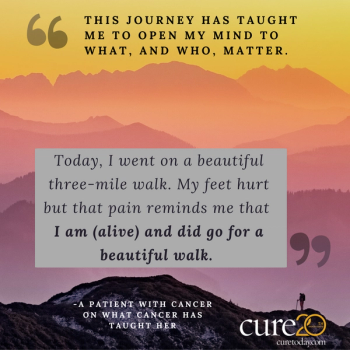
CURE® surveyed its audience to gather insight into what unexpected lessons cancer has taught them. Here’s what they had to say.

CURE® surveyed its audience to see how cancer-related pain or treatment-related side effects interfered with their ability to be independent. Here’s what they had to say.

I grew up in a society where mental health was stigmatized, but cancer made me realize that it helps to speak up about these issues.

I never thought I’d admit experiencing fear of cancer recurrence, but at a recent medical appointment I realized that I struggle with this fear daily.
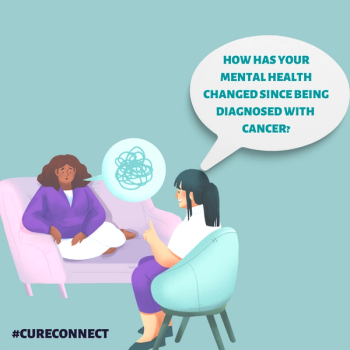
CURE® surveyed its audience to see how their cancer diagnosis affected their mental health. Here’s what they had to say.
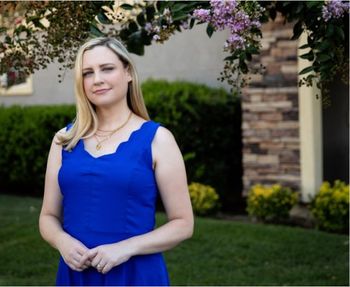
Cognitive therapy, teletherapy, journaling and taking up other daily activities may help cancer survivors overcome their fear of recurrence.

Cancer is talked about more openly nowadays, and while watching a movie with my daughter, a scene portraying a character in hospice care gave me flashbacks to our cancer experience.

CURE® surveyed its audience to see how they cope with fear of cancer recurrence. Here’s what they had to say.
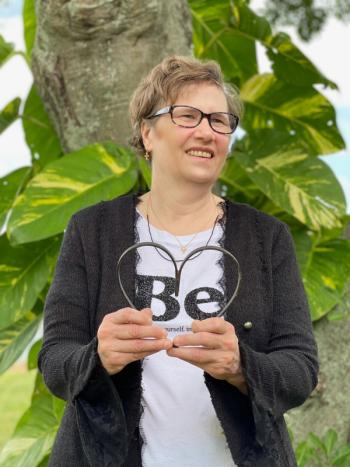
Prior to my breast cancer diagnosis, my only goal in life was for my son to turn 16 so he could drive me to and from the local bars. Now I can’t help but think that my cancer was meant for me to change my life.
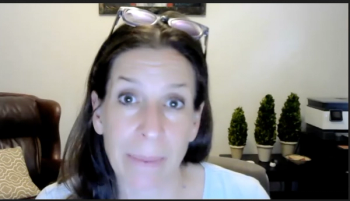
A psychiatrist advises patients with cancer to speak up about their mental health concerns during cancer treatment, as there are tools that can guide best next steps.

With society entrenched in an “infodemic,” it can be challenging for many patients with cancer to identify what information online is accurate. Recently, the development of a new tool may help patients decipher what news is misleading.

My oncology team and I decided that it was OK to decrease the frequency of cancer-related scans, leaving me both relieved and nervous.

I frequently relive the day I was diagnosed with cancer and realized that I may need to limit my exposure to other people’s cancer battles.

Beyond its lessons, cancer has also brought, along with the fear and anxiety, a conviction to empower myself and to create a life that I deserve: One in which joy can triumph over that fear and that anxiety.

Heartbreak and loss trail behind us every day in the cancer world. But so does understanding, friendship and love.

As I reflect on the month of June, I see it as my “rebirth,” as four years ago, I was diagnosed with cancer, and my life has not been the same ever since.

In less than a year, Christine Whelchel went from receiving a diagnosis of breast cancer to becoming a trailblazing “Jeopardy!” champion.

After cancer, I now have more empathy for people going through health crises, though when I see others posting inspirational stories on social media, I can’t help but to wonder how much strife they have actually been through.